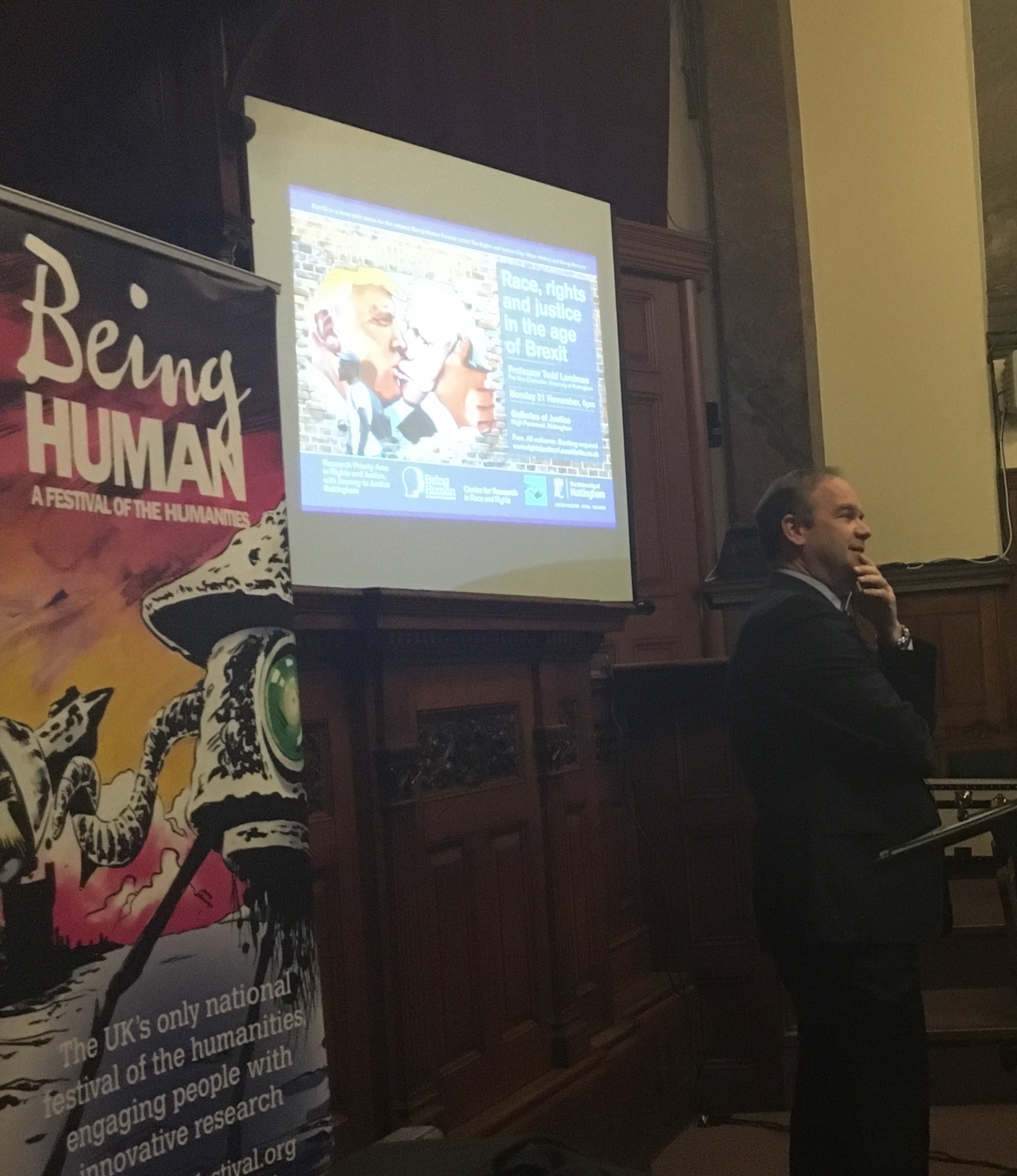
November 23, 2016, by Charlotte Anscombe
Race, Rights and Justice in the Age of Brexit
Professor Todd Landman,Pro Vice Chancellor of the Faculty of Social Sciences, puts forward his recommendations for the post-Brexit future and challenges everyone to consider their responsibility for living, humanely, in a post-referendum world.
In Democracy and the Market, Adam Przeworski argues that transitional countries experience a significant downturn in economic performance in the short term and then as democracy takes root, economic performance returns in ways that support the new democracy. Watching events here in the UK since the EU referendum on 23 June, I can’t help feeling that the UK now looks very much like one of Przeworski’s transitional countries and is experiencing precisely the same kind of economic downturn as a result of the vote to leave the EU.
We now find ourselves in a significant ‘Brexit dip’ in economic performance. The pound against the dollar has dropped to levels not seen in thirty years, while leaders of business surveyed by the Institute of Directors (IoD) are fairly pessimistic about the immediate future of the British economy. So much so, that many report a stall in investment, a freeze on hiring, and in some cases, redundancies. We have also seen reports concerning small and large banks looking to relocate by the end of 2016 and the early months of 2017.
In addition to the economic downturn, we have seen both main political parties in crisis, as the struggle for power ensues. The Prime Minister resigned the day after the referendum, the shadow cabinet and junior shadow ministers have resigned, and the summer saw a leadership contest in both parties, where Theresa May emerged as the new Tory Prime Minister and Jeremy Corbyn reconfirmed his leadership of the Labour Party. Leave campaign leaders have scrambled to clarify what they actually mean by Brexit, the Remain campaign leaders have looked at legal loopholes and procedures that might reverse the decision, or at least limit its most negative consequences, and the Scots are exploring their own independence given their overwhelming vote to Remain.
Increase in hate crimes
We also have seen a sharp rise in hate crimes reported to the police. Race and religious hate crimes rose 41% after the referendum: nearly 5,500 racially or religiously motivated offences were reported to police in the month after the vote, new Home Office figures revealed in October. My own discussions with the senior leadership of the region’s police confirm that similar patterns have been observed in the greater Nottingham area. The UK once again has to confront questions of equality, tolerance and hate. Does the marked rise in hate crimes signal a new age of intolerance? How should the UK engage with questions of race, rights and justice in the Age of Brexit? How should the city of Nottingham? As an immigrant and permanent resident in the UK who works with many EU and other citizens, these issues are paramount for the future of society, economy, and polity.
It is incumbent on the new leadership to act decisively to bring certainty and confidence back to the UK economy. One possible outcome for the future is the irony of the UK having to pay as much as it pays now and to accept only a minor reduction in migration, while at the same time having to give up its place at the EU table. The Leave campaign made a meal out of the crumbling castle of the EU and lambasted the Remain campaign’s insistence that the UK would be stronger in Europe, and yet the outcome of any Article 50 negotiations may well see the UK maintaining payments, accepting migrants, and losing influence. Meanwhile, one of the main societal groups who voted for Leave will be very unlikely to see any real benefit from their vote. But we also need leadership to reduce hate crime, increase reporting and improve support for victims.
Earlier this week, at the Galleries of Justice, I raised recommendations for the post-Brexit future and challenged everyone to consider our responsibility for living, humanely, in our post-referendum world. The event was part of a series called The Rights and Justice City: Hope, History and Being Humane, for the national Being Human Festival. It was hosted by the Research Priority Area in Rights and Justice and the Centre for Research in Race and Rights, in collaboration with Journey to Justice Nottingham. You can see a video of my remarks from our Facebook live stream.
No comments yet, fill out a comment to be the first

Leave a Reply